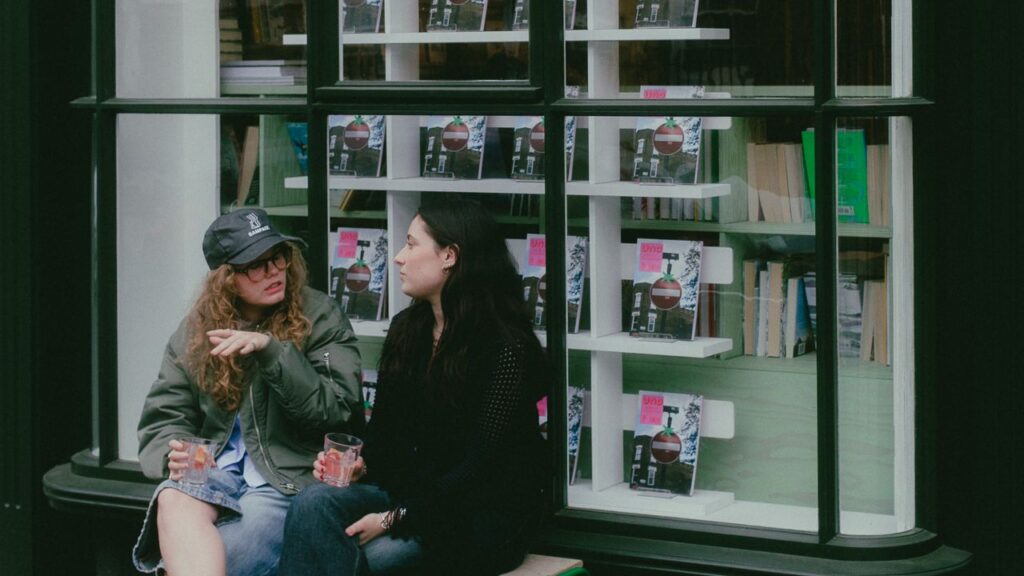Danielle has shared her recommended autumn reads with British Vogue, below.
Nova Scotia House, Charlie Porter
Autumn feels like the right time to read Charlie Porter’s breathtaking debut novel Nova Scotia House. Told in a fluid, stream-of-consciousness voice, the narrator, Johnny, drifts back three decades to the brief, formative years he spent with his partner, Jerry, before his death from HIV-related complications. Though set at the height of the AIDS crisis, the book is sex-positive, sensorial and celebratory – and a timely reminder of the emotional, economic and political resilience of counterculture communities, even during the worst of times. If the current months can feel a little dark and perhaps lonely, Porter reminds us in glimmering prose that the possibility of finding joy, love and chosen family may take work, but always remains possible.
Mother Mary Comes to Me, Arundhati Roy
It has been years since I last read Arundhati Roy, whose Booker Prize-winning debut The God of Small Things (1997) made her a literary superstar. Mother Mary Comes to Me, her first memoir, has just been released, and focuses on her complex relationship with her indomitable, domineering mother, the educator and feminist Mary Roy, introduced in an opening chapter titled “Gangster”. At a time of year when family reunions loom for many, this frank portrait of a love-hate bond between mother and daughter (and the complex ties between siblings) feels especially resonant. Roy’s prose is as lucid and beautiful as I remembered, and few memoirs offer such self-examination and candour.
House of Day, House of Night, Olga Tokarczuk
Reading Olga Tokarczuk can feel like walking through a beautiful, creepy fog – in the best possible way. House of Day, House of Night was first published by the Polish Nobel laureate in 1998, and has just been reissued from independent press Fitzcarraldo Editions, translated by Antonia Lloyd-Jones. Like much of her work, House of Day, House of Night resists easy description: it’s not a conventional novel but a mosaic of interlinked pieces set around a borderland village, where winter mushrooms push from abandoned cars in the forest. There is no single plot and as strange fragments accumulate – folkloric tales of saints, housekeeping notes, dream diaries and recipes – the real blurs into the imagined. Ultimately, Tokarczuk’s witty, accessible prose propels you forward. She remains a literary cosmologist of sorts: few of us will grasp every depth and layer of her work, but there is real reward – and even fun – in the trying.
So Late in the Day, Claire Keegan
I am regularly asked by customers for recommendations to break a reading rut. I often suggest slimmer reads, as I think that finishing one short, sharp book can restore your sense of being a “reader”, and carry you into the next. Some favourites I recommend include Natasha Brown’s Assembly, Eva Baltasar’s Boulder, David Szalay’s Turbulence, and I’m particularly looking forward to The Woman Dies, Aoko Matsuda’s forthcoming short story collection. So Late in the Day has just appeared in paperback at a very slender 47 pages, and confirms Keegan’s status as one of the finest writers of her generation. In elegant, economical prose told from the perspective of Cathal, a Dublin man clocking off from work for the weekend, this surprising story exposes the cracks in the deep-seated patriarchal culture that infiltrates our relationships and homes. Every word Keegan writes counts – a stunning read.
The Juniper Tree, Barbara Comyns
Hibernation season is a great time to revisit lost classics. Often described as a neglected genius, English novelist Barbara Comyns belongs to that large group of women whose work has been forgotten or overlooked. I recently read some of her early work from the 1940s and immediately connected with her savage wit and unsentimental prose. Her writing still feels incredibly modern, like listening to your deadpan, devastatingly funny best friend recount a terrible year. The Juniper Tree (1985) loosely reimagines the Brothers Grimm tale in post-war suburban England. A young single mother with a disfiguring scar befriends a glamorous couple, and there are consequences, but not the ones you might expect. Comyns turns an acidic, blackly comic gaze on suburban poverty, racism and familial indifference – it’s a perfect introduction to one of Britain’s great underappreciated 20th-century novelists.

